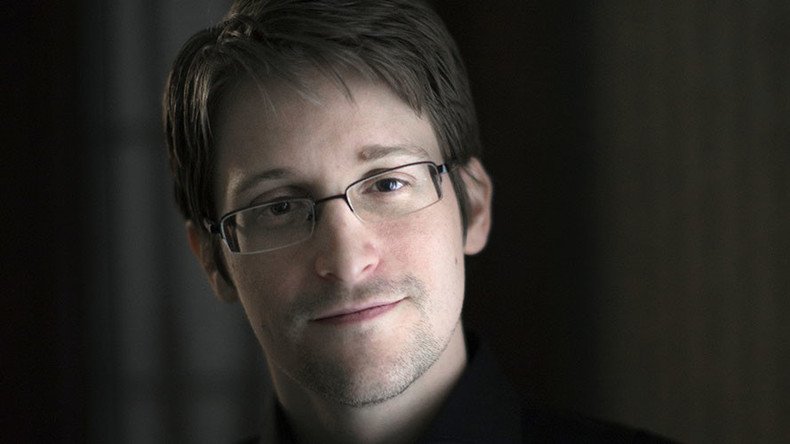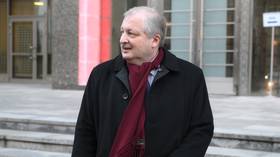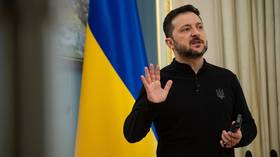Why a US presidential pardon for Edward Snowden is not such a crazy idea after all

This Friday, Oliver Stone’s film 'Snowden' hits theaters. The release will be accompanied by a campaign that is focused on procuring a presidential pardon for the whistleblower who revealed the NSA’s mass surveillance program in 2013.
With the campaign yet to launch, coverage of Snowden’s prospects has tended to the dismal. Tech site Engadget described a pardon as "unlikely", while the BBC pronounced the chances of one being issued by Obama as "somewhere between zero and infinitismal".
While their skepticism is certainly well-founded, some reflection on the institution of the pardon is called for. American presidential pardons are more common than one might think. The tacky custom of having the President pardon a turkey before Thanksgiving might soak up most of the media coverage, but pardons are relatively frequent, and are often issued for the most mundane of crimes.
In addition to a slew of pardons and commutations relating to drug offenses, some of those pardoned by Obama include Robert Lee Foster, pardoned in 2010 for - nearly fifty years previously - having committed the obscure felony known as ‘mutilation of coins’ (to wit, cutting the edges off pennies in order to use them as dimes in vending machines); Edgar Leopold Kranz Jr. who was discharged from the military in the mid-90s for ‘wrongful use of cocaine’, adultery, and writing some bounced checks; and Bobby Gerald Wilson convicted of illegally selling alligator hides in 1985.
However, historically, the pardon was intended, and has been used, for far more serious crime; crime, in fact, of an often overtly political nature.
The Presidential pardon is embedded in Article II, Section 2 of the US Constitution in a passage that deals predominately with the President’s position as Commander-in-Chief of American military forces. In itself this is an indication that the Framers saw the pardon primarily in terms of crimes relating to national security. This interpretation is supported by the fact that one of the Founding Fathers, Alexander Hamilton, justified the Presidential pardon with the following reasoning: "[I]n seasons of insurrection or rebellion, there are often critical moments, when a well-timed offer of pardon to the insurgents or rebels may restore the tranquility of the commonwealth; and which, if suffered to pass unimproved, it may never be possible afterwards to recall.”
In other words, the Framers intended the Presidential pardon as a mechanism to heal the nation from deep, potentially fatal divisions, and explicitly foresaw that it would cover even obvious acts of treason or sedition. Such actions were certainly more on the Framers’ minds than peddling alligator skins or cocaine.
In fact, the first prominent case concerned George Washington’s pardon for the leaders of the Whiskey Rebellion, an armed resistance to hefty liquor taxes that took place in the late 18th century and required 13 000 troops to put down. Andrew Johnson, who took the reins of power after Lincoln’s assassination granted a blanket pardon to those who fought against the Union in the American Civil War, while Jimmy Carter pardoned Vietnam draft dodgers en masse in 1977, allowing many of them to return home from Canada. More recently, Bill Clinton commuted the sentences of over a dozen members of FALN, a paramilitary group seeking independence for Puerto Rico. Over its history, FALN let off over 100 bombs in the United States, and at one point, opened fire on the US House of Representatives (none of those granted clemency were convicted of an act directly causing injury).
Even Gerald Ford’s pardon of former President Richard Nixon could plausibly be considered as a genuine attempt to move beyond the scandal and discord that erupted when Nixon’s involvement in wire-tapping the Democratic National Committee offices was revealed.
In light of this history, the White House’s rejection of a previous petition to pardon Snowden because he made a "dangerous decision" to disclose information that "had severe consequences for the security of our country" comes across pretty thin. The American Civil War, one would think, also had ‘severe consequences’ for the security of the United States. Unlike in Snowden’s case, one might even be able to name some of those consequences. So when Snowden’s lawyer Ben Wizner says that his client’s is "one of those rare cases for which the pardon power exists" he is absolutely right. If anything, pardoning Snowden would be a rather minor act on the grand scale of history; clemency for a ‘breach’ of national security that, unlike so many others, was conducted without a view to personal gain and with no actual bloodshed.
The Framers of the Constitution would likely agree that Snowden represents an infinitely more eligible candidate for pardon than some who have lately received one, for the pardon not only protects the adulterers and writers of bounced checks among us, but also goes a long way to helping Presidential cronies out of a tight spot.
George W. Bush commuted Scooter Libby’s sentence for making false statements in relation to the Plame affair in which the identity of CIA agent Valerie Plame was leaked after her husband publicly criticized government claims in the run-up to the Iraq War; and Bill Clinton didn’t limit himself to Puerto Rican independence fighters; he also found time to pardon his own brother for a previous conviction of cocaine possession, as well his former business partner Susan McDougal, who had served a prison sentence for refusing to testify before a grand jury about Clinton’s involvement in the Whitewater controversy as well as a separate sentence for her own role in the affair. Pardons for tax evasion and making illegal campaign contributions have also been issued by recent presidents.
Would you give up everything for something you believe in? See @hitRECordJoe & @ShaileneWoodley in #SnowdenMovie. pic.twitter.com/7noJzT9ruO
— Snowden Movie (@SnowdenTheMovie) September 9, 2016
For Obama, pardoning Snowden would be a chance to turn both the recent use of the pardon and his own personal legacy around. Heading into the election in November, Obama is still the President everyone wanted to like, but also the one who colossally failed to deliver on the ‘Hope’ and ‘Change’ his voters so desperately wanted. Issuing pardons for Snowden, Chelsea Manning and other whistleblowers would give Obama a chance to return the pardon to its roots – dealing with national security issues and healing division – as well as using it as a tool to restore justice, rather than perpetrate injustice. It would be a step in the right direction in restoring Americans’ confidence in the justice system, of which the pardon essentially functions as the emergency valve. Perhaps, most importantly for Obama, it would be the first really gutsy move in an eight-year Presidency that has been the equivalent of a limp handshake.
Considering that Donald Trump suggested (repeatedly) in a 2013 Fox interview that Snowden be executed, a position he seemed to be holding to as of early 2016, and that Clinton has stuck to a cold but persistent line that Snowden would have been protected as a whistleblower in the United States and that his actions can therefore not be justified, Snowden’s prospects under the next President don’t look terribly bright. If anything, it is slightly easier to imagine the one talking about execution eventually pardoning Snowden – public forgiveness seems like the kind of ostentatious gesture The Donald might, in the right mood, be unable to resist.
By contrast, Green candidate Jill Stein has said she would not only pardon Snowden, but make him a member of her cabinet and Libertarian candidate Gary Johnson has said he would consider a pardon for the whistleblower. But as neither is likely to top the poll on November 8th, Snowden’s best hopes still lie with Obama, who has the kind of golden opportunity that Hamilton was referring to; an opportunity to correct mistakes and heal divisions. Otherwise, it will surely go down in history as one of the most indelible stains on his career that a President who was willing to dish out pardons for ‘coin mutilation’, bounced checks and selling alligator skins, refused clemency to someone who exposed a mass violation of the very Constitution he was sworn to preserve and defend.
The statements, views and opinions expressed in this column are solely those of the author and do not necessarily represent those of RT.















